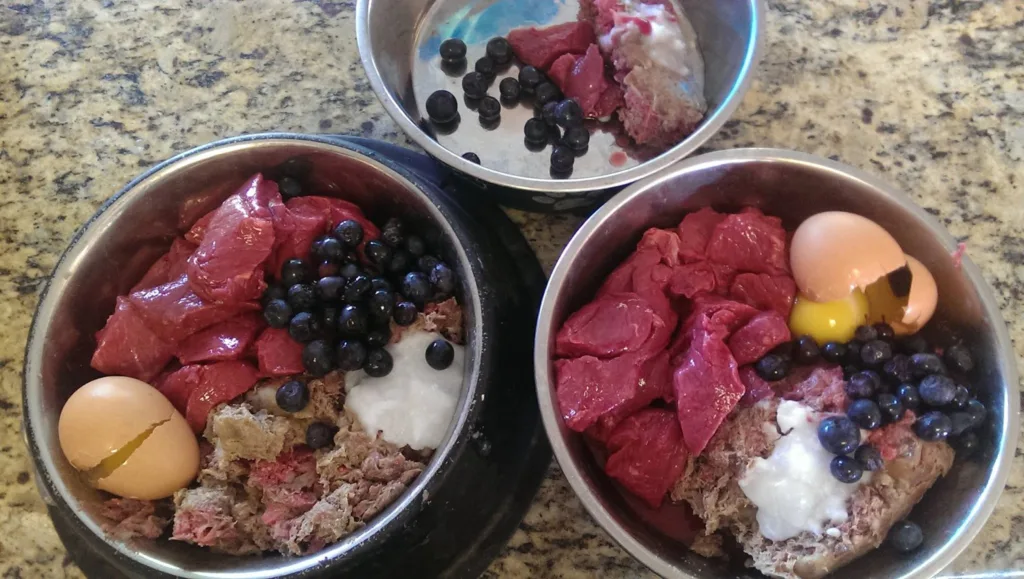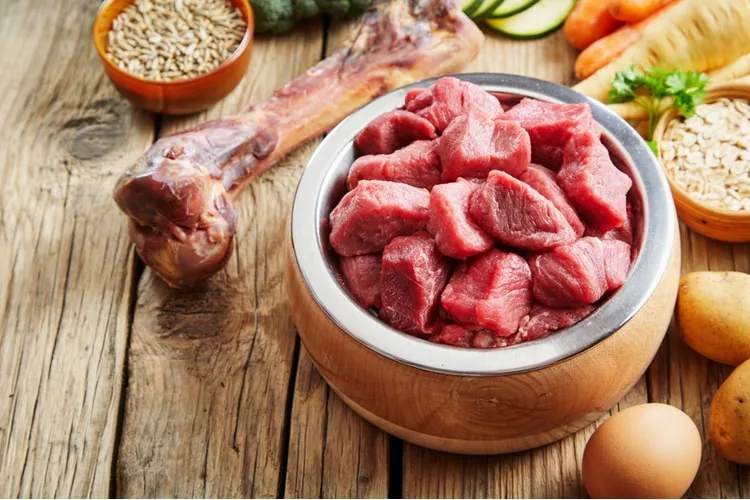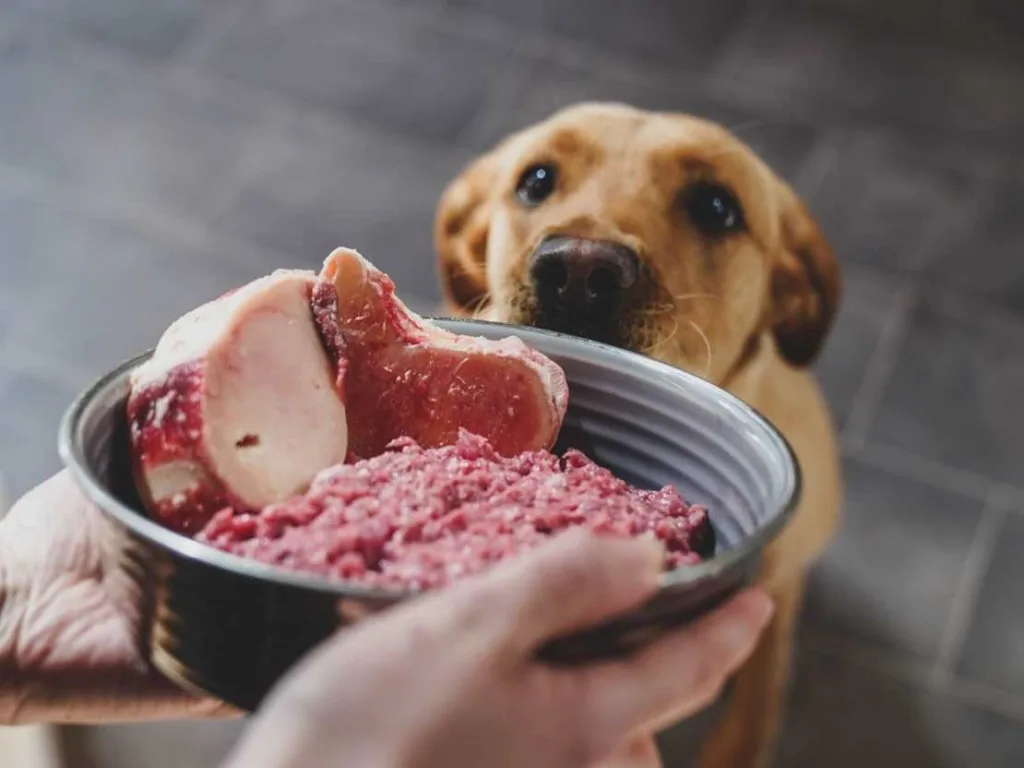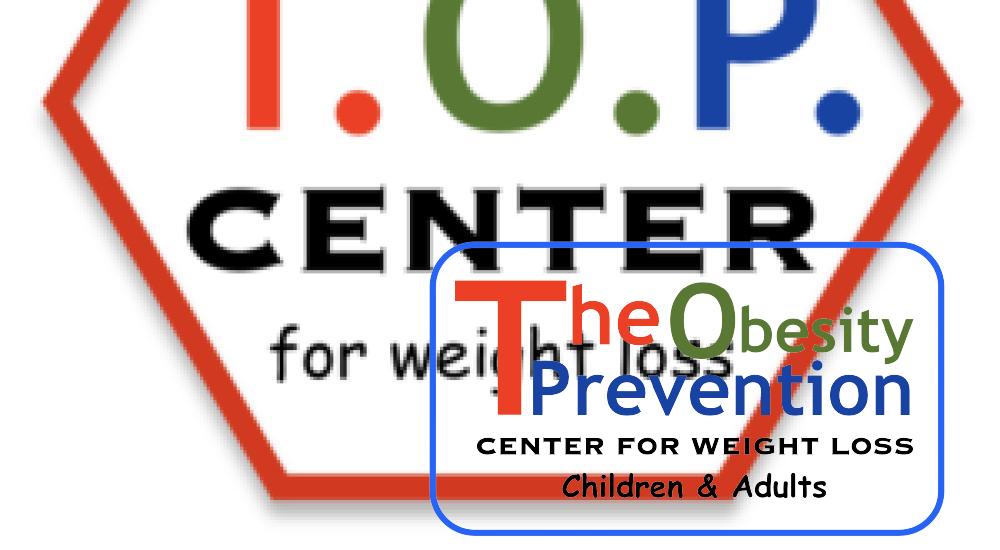Unveiling the Power of Raw Nutrition for Your Furry Friend
Raw diets for dogs have been gaining tremendous interest among pet parents lately. This growing trend stems from the realization that our canine companions thrive on fresh, wholesome foods in their natural state. A raw diet typically consists of uncooked meat, bones, organ meats, fruits, vegetables, and healthy fats. Feeding raw provides nutritional benefits that are often lacking in processed kibble and canned foods. The goal is to mimic what dogs would eat in the wild. A properly balanced raw diet delivers optimal nutrition to fuel your dog’s health and happiness.
In this post, we will explore the six fundamental nutrient groups found in a complete raw diet for dogs. Understanding the role these nutrients play will empower you to craft a diet that meets your furry friend’s unique needs. When sourced thoughtfully and fed consistently, these nutritional building blocks set the foundation for extraordinary wellness from nose to tail. Let’s dig in and uncover the awesomeness of raw feeding for canines!

Protein Powerhouses: The Foundation of a Raw Canine Diet
Protein is the superhero ingredient your dog’s body needs most. That’s because proteins provide amino acids, which are the building blocks for robust muscles, bones, enzymes, hormones, and more. Without sufficient protein, your pup’s body cannot function properly. Animal-based proteins should compose at least 50% of your dog’s diet.
Lean meat, poultry, fish, and eggs offer complete, highly bioavailable protein sources. Beef, bison, lamb, turkey, chicken, duck, salmon, whitefish, and tuna are excellent choices. Switch up proteins frequently to provide variety. Be sure meats are fresh, humanely raised, and antibiotic/hormone-free whenever possible.
The protein in raw food diets allows dogs to develop and maintain strong, resilient muscles. An active canine needs more protein than a couch potato pup. Protein also delivers lasting energy to fuel your dog’s activity levels. Moreover, proteins support metabolic function, tissue repair, fluid balance, nutrient transportation, and a healthy immune system. Simply put, robust protein intake is crucial for your dog’s optimal health and performance.
Make sure to feed a variety of protein sources to give your dog a complete amino acid profile. Muscle meats like chicken breast provide great protein content, while organ meats like liver deliver vitamins and minerals. Mixing up red meat, poultry, fish, and eggs ensures nutritional balance. Dogs with allergies may need limited ingredients while robust dogs can handle more variety. Adjust accordingly based on your individual pup.
When preparing raw proteins, be mindful of food safety. Thaw frozen meat and fish in the refrigerator rather than the countertop. Wash hands, utensils and surfaces thoroughly after handling raw meat. Store foods properly and pay attention to expiration dates. Feed fresh foods as soon as possible rather than leaving them out for extended periods. Take care when transporting and storing raw food to avoid cross-contamination. With sound handling practices, raw diets are safe as well as nutritious.

Healthy Fats: Nourishing Your Dog’s Body and Mind
While the word “fat” has a bad reputation, healthy fats are actually vital in your dog’s diet. The key is to focus on high-quality, balanced sources. Fats provide energy, cushion organs, insulate the body, transport fat-soluble vitamins, and nourish skin, coat, joints, brain, and heart health.
Great options include omega-3 rich fish oils from wild caught fish, medium chain triglycerides from coconut oil, and alpha-linolenic acid from flaxseeds or chia seeds. Other excellent additions are fattier meats like chicken thighs, duck, lamb, and fatty fish like salmon and sardines. Healthy fats support cognition, vision, inflammation reduction, immune function, joint lubrication, skin and coat condition.
The optimal amount of fat for your raw fed dog depends on activity level, environment, and health status. A general starting point is around 15% of total calories from fat. Pay attention to your dog’s body condition, energy, coat, and stool to fine tune their needs. Supplying nourishing fats gives your pup’s whole being a healthy boost!
Omega-3s found in fish, fish oils, flax and chia provide anti-inflammatory benefits to reduce joint pain and enhance cognitive function. Medium chain triglycerides from coconut oil offer easily absorbed energy. Monounsaturated fats in olive oil can improve heart health. Limit high omega-6 foods like poultry skin which cause inflammation. Aim for a good omega-3 to omega-6 ratio.
Adding digestive enzymes when feeding fattier meats can help obese or senior dogs better absorb and utilize the nutrients. Chewable enzyme supplements with lipase break down fat for improved digestion and assimilation. A spoonful of coconut oil supports cognitive abilities while also satisfying hunger between meals. Take a whole-body approach by nourishing your dog inside and out with high quality fats.

Crunchy Carbs: Providing Energy and Vital Nutrients
While dogs have no mandatory carbohydrate requirements, limited starchy carbs can complement a raw diet. Vegetables, fruits, nuts and seeds can provide antioxidants, phytonutrients, fiber, vitamins, and minerals. Go for lower glycemic veggies like leafy greens, broccoli, cauliflower, and celery which offer nutrients without spiking blood sugar.
Fruits like blueberries, apples, and watermelon deliver vitamin C, potassium, and antioxidants. Squashes supply beta carotene. Sweet potatoes and yams offer fiber, vitamin A, and potassium. Quinoa and brown rice can add B vitamins and magnesium. Always soak rice before cooking to reduce phytic acid. Monitor your dog’s reaction since some struggle to digest grains.
Carbohydrates give dogs sustained energy for an active lifestyle. They also help create satiety. Vegetables aid digestion and renal function. Overall, around 5-15% carbs from fresh produce can optimize a raw diet, but aren’t mandatory. Focus on low-glycemic choices packed with micronutrients.
Leafy greens like kale, spinach, lettuce and collard greens provide calcium, iron and vitamins without excess calories. Broccoli and green beans offer a health dose of fiber to aid digestion and improve stool quality. Squashes like pumpkin deliver beta carotene which becomes vitamin A in the body. Berries satisfy sweet cravings thanks to antioxidants. Moderation is key with fruits due to natural sugars. Always introduce new foods slowly.
Lightly cooked starchy veggies like sweet potato and yam provide an energy boost for active dogs. Some raw fed dogs do well with limited whole grains like brown rice, millet or quinoa. Start with just 1-2 tablespoons per meal to assess tolerance. Soaking rice before cooking increases digestibility. Avoid wheat, corn and white potatoes which can trigger allergies. Focus on limited low glycemic carbs.
Abundant Vitamins & Minerals: Building Blocks of Canine Wellness
In addition to macronutrients like protein, fat and carbs, dogs need ample micronutrients for peak performance. Vitamins and minerals act as the ingredients that make balanced nutrition possible. Deficiencies or excesses can create negative ripple effects.
Here are some of the most crucial:
- Vitamin A – Supports vision, reproduction, immune function, skin and coat. Found in liver, fish oil, carrots.
- Vitamin D – Crucial for bone health and calcium absorption. Best sourced from sun exposure, fish, eggs.
- Vitamin E – Boosts cell signaling, immune health, antioxidant activity. From nuts, seeds, leafy greens.
- Calcium – Critical for bone, muscle, heart, nerve health. Bones, dairy, leafy greens supply calcium.
- Phosphorus – Works with calcium for bone mineralization. Meats, eggs, fish provide phosphorus.
- Iron – Helps transport oxygen via red blood cells. Found in meat, poultry, fish.
Variety and balance ensures your dog receives the full spectrum of vitamins and minerals needed to thrive. A nutritious raw diet nourishes your canine companion from the inside out!
Bone meal powder or raw meaty bones provide calcium and phosphorus in the ideal 1:1 ratio for bone health. Eggshell powder also delivers calcium and vitamin D. Seaweed contains iodine, vitamins and minerals. Liver supplies vitamin A, B vitamins and iron. Fish, nuts and seeds provide vitamin E and trace minerals like zinc and selenium. A whole food diet offers nature’s micronutrients.
Excessive calcium from bones can inhibit iron and zinc absorption. Rotate bone-in and boneless meals. Excessive vitamin A from liver can lead to toxicity. Feed liver no more than once a week in modest portions. Work with your holistic vet to identify any specific deficiencies and customize supplementation as needed. With balance and variety, your dog’s micronutrient needs are covered.

Nurturing Your Dog’s Health with a Thoughtful Raw Diet
As you can see, raw diets packed with quality proteins, fats, limited carbs, and ample micronutrients provide the nutritional foundation your dog needs for extraordinary wellness. Each of the six key nutrient groups plays a role in optimal energy, growth, performance, disease prevention, and longevity.
Crafting a balanced raw diet may feel intimidating at first. But taking it step-by-step, focusing on variety and fresh ingredients, and monitoring your dog’s response, will set you up for success. Your dog will thank you with their stellar health, vibrant energy, and unconditional love.
Empower yourself to nourish your furry best friend’s overall wellbeing with the power of raw feeding. Join our community and learn more about this transformative approach for your pup!
Free Newsletter
Want to learn more about raw diets for dogs? Sign up to our free newsletter. You may also read through our blog for related topics.
Book a Free 10-Minute Raw Diet Consult
Want personal guidance for your dog’s raw diet? Book a free 10-minute video consult with one of our certified experts. Ask anything about transitioning, nutrition needs, balancing meals, and more. Availability is limited!
Thank you for reading this post, don't forget to subscribe to our free newsletter
!
